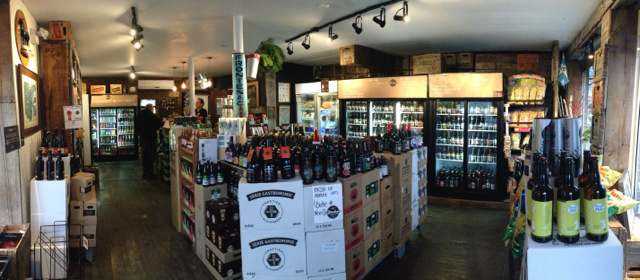Quebec’s beer game is as strong as your favourite craft pint
Sipping his homemade La Rurale beer, Patrice Schoune, the founder of the first brewery farm in North America, stands proudly in the middle of his tasting room wearing a beret. Schoune is one of the pioneers who, in the late ‘80s, re-launched the craft beer, also known as microbrasserie, market in Quebec.
Twenty-five years ago, there were only three big players in the beer industry, all industrial: Molson, Labatt and O’Keefe. They held almost 100 per cent of the market. Then some little players started to produce beer on a smaller scale.

“We were 11 around the table when I started, in 1996. We are now more than a hundred,” said Schoune, while sipping his hoppey beer.
In the ‘90s, the market was a roller-coaster. Many brewers joined big breweries, many crashed and others restarted. “In the breweries that appeared on the market at the same time as me, I’m the only one who stayed,” said Schoune, explaining that all the others tried to grow up too fast and went out of business. This successful brewer’s experience shows that this market should be handled with care.
A report by the Association of Quebec’s Microbreweries shows that there were 31 licenced microbreweries in 2002. Today there are 119, and the microbrewery market is booming.
Unibroue distinguished itself in the Quebec market with intricately artistic labels, beautiful names and gourmet beer. “We began to understand that beer could be fine, noble and as prestigious as wine,” said David Deschênes, the owner of Le Biérologue, a local beer store in Montreal.
Les 3 Brasseurs, a famous French brewery chain, pairs its beers with gastronomic food. Julien Lafortune, brewer-in-chief at the Ste-Catherine St. location, which has a 2500,00 litre brewer, explained the concept of the brew pub by pointing at the menu: “We suggest a beer for each of our dishes,” he said. One of them, La Marie, is the district beer, created by the brewer specifically to meet the demands of customers.
The demand for gourmet beers comes from a renewed desire for flavourful and craft products. “The brewing revolution is the same as bread and cheese. Consumers want true products that cost [more due to higher quality]. The market’s here, and the market wants real products,” said Schoune.
Consumers also want to know the origin of the products they buy. At the microbrewery La Succursale in Montreal, a glass window allows consumers to follow the beer production from the main room. “People are interested. We don’t have much contact with industrial production processes,” said Jean-Philippe Lalonde, brewer for La Succursale, adding, “It’s also an educational mission.”
Lalonde knew how to combine innovation with local ingredients. His beer La Triple Reine is produced with honey from the company Bee Api, which harvests from its hives in the Rosemont area.
Deschênes’s store also has an educational aspect. “Our mission is to make known and loved the culture of beer and beer itself,” he said. Deschênes noted that people who frequented his shop over the last two years acquired basic or even strong knowledge of beer. “People can now speak about style before speaking about colour,” said Deschênes, sipping a beer with a milky colour that differs from most industrial translucent ones.
But what makes Quebec microbreweries notable is their innovation, which comes from the northwestern U.S. and its bitter hop beers. According to Schoune, the breweries that have succeeded are those that understand how it works in the United States and established the same methods in Quebec. “Here we can produce crazy beer, just like in the United States,” said Schoune.
Thanks to its innovation, Quebec’s craft beer market attracts more and more passionate beer-lovers. One example is Sylvain Roussel, who is originally from Belgium, moved to Quebec recently, and is now an employee at La Ferme Brasserie Schoune.
“The market is new and we can vary the ideas here,” said the apprentice brewer. “In Belgium it is very traditional and it’s really hard to launch because of the institutions. There’s more opportunity in Quebec.”
With this new interest in craft beer, the association of Quebec’s microbreweries expects to reach 12 per cent of the market by 2017.
“We are now at six per cent, and it will probably rise to 10 per cent or 15 per cent of the market,” said Schoune. Ontario is already at 10 per cent and the United States at 14 per cent, with an increase of 12 per cent per year in the U.S. Quebec’s market is a bit different.
“In Quebec, the big breweries can still buy space in the grocery stores, and it’s the only area of North America that does that. That’s why it [the market] is much slower in Quebec,” said Schoune.
At Concordia University, some beer-passionate students created the Co-op Les Brasseurs Illuminés in June 2014. The co-op aims to “become a source of sustainable, high quality and locally produced beer in the Montreal and Concordia University communities,” according to their website. After the success of their first Winter Warmer Beer Fest last November, Concordians are looking forward to their next event.
In the future, Quebecers can expect the craft beer market to grow even more through the microbrewery concept, which is the fastest growing market, according to Schoune.
“There are many hoops and many hurdles, and this is why you have to persevere to succeed in this market,” he said.



